Based on their topic, blogs and podcasts fall into one of two categories: niche or lifestyle. Even if a lifestyle blog or podcast has a limited number of complementary topics, the topics will have different themes. Health, fashion and movie reviews may all appeal to the same individual or audience, and they may even have some interconnected or overlapping themes, but by definition, a niche is small(er) and specialized.
“Wait – nobody has only one interest. My audience wants variety!” True. However, they want to be in control of that variety; you don’t need to do it for them. Readers and listeners like an array of topics overall, but they want to cherry-pick those topics from niche blogs.
“Okay, but my favorite blogs and podcasts cover a bunch of different topics.” Mine too! We’re not talking about big names here, though. When you’ve had a blog or podcast become successful, you can play around with adding new topics and branching out (we did that here on the Elegant Themes blog). A lot of those lifestyle-esque productions started with a certain niche, then they listened to their audience and grew from there.
8 Reasons to Niche Down
A lifestyle blog or podcast sounds like it comes with a lot of freedom, but there’s actually a lot of pressure to diversify and constantly exercise that freedom. That sounds kind of stifling, doesn’t it? Niche blogs and podcasts provide just enough structure to help you concentrate. Here are more reasons to niche down:
- You’ll immediately know if your idea is a good fit for your blog or podcast. If the topic doesn’t fit with the niche, it’s a hard “no.”
- Niche blogs are must-visits, while lifestyle blogs are more, “I’ll visit when I have time and if I remember.”
- Readers and listeners love the efficiency of a niche blog/podcast. They know exactly where to go for that thing they want to learn more about.
- If your readers or listeners are interested in one blog post or episode, they’ll likely be interested in everything else you publish, too.
- As your audience is learning about the topic (and you), you’ll learn about your audience. Churn rate will reduce and you’ll get better at delivering exactly what readers or listeners want.
- This also makes the audience ripe for email list building. They know what they’re getting and you know what to keep delivering.
- If you’re hoping to monetize your blog or podcast, a niche will make it easier to secure advertising or to have your affiliate links actually used by your audience.
- You’ll become an expert in the topic, and that’s an important part of marketing and sales (attracting people to your expertise).
Now that you know why you should choose a niche, let’s get into how to choose one.
Decide on a Topic to Cover
Creating a niche blog or podcast means that you’ll spend a ton of time with the topic you choose, so you better make it something you’re interested in enough to marry. Even if you choose a highly lucrative niche, it’s not a guaranteed income stream. While there may be a demand for content, you won’t churn out excellent blog posts or podcast episodes. Try writing about something that bores you – you may get words down on paper, but who’ll want to read them?
Niche blogs and podcasts are purposeful, and you have to dig into that purpose and then keep digging even when you think you’ve exhausted potential topics. If you don’t think you’ll be able to write at least 100 articles or scripts on your topic – either because you don’t like the topic enough or there isn’t that much to say about it – this isn’t the niche for you.
Brainstorming Potential Blog or Podcast Topics
Later on, we’ll determine if your niche is viable. Right now, you just have to figure out what you want to create content about. Do a brain dump and write down everything you’re an expert in and/or interested in. Here are a few questions to help:
- Look around your home. What decor, food, fashion and tech do you like to be surrounded by?
- What do you do and use every day? Is there anything you want to do more or less of?
- How do you spend your time on vacation or when you’re sick? You may uncover passions or comforts that you want to spend more time exploring.
- What topic do you love talking about so much you feel like you can never say enough?
- Do you know more about a certain topic than most people?
Idea Generation to Test Your Niche and Interest Level
Pick a niche and see if you can come up with 100 ideas right off the bat. If you’re struggling to get to 100, that doesn’t mean this is a poor choice. Try this: come up with three ideas related to your niche. For each one, think of at least two different angles you can approach it from. Now you have nine ideas – three original ideas (which can be “intros to” or “overviews of” the subject) and then two angles for each. Here’s an example:
My blog niche is how to find writing jobs. I quickly come up with three ideas related to the niche: job boards, cold emails and creating a portfolio. These become three topic overviews:
- Why You Should Be Looking at Job Boards Every Day
- X Reasons to Send Cold Emails to Potential Clients
- Here’s Why Every Writer Needs a Portfolio
Then I can approach each topic from two angles:
- Job Boards Article 1: The X Best Job Boards to Search Daily
- Job Boards Article 2: The Worst Job Boards That Aren’t Worth Your Time
- Cold Emails Article 1: How to Write a Cold Email That Works
- Cold Emails Article 2: X Rookie Mistakes to Avoid in Your Cold Email
- Creating a Portfolio Article 1: How to Build a Portfolio When You Don’t Have Any Clippings
- Creating a Portfolio Article 2: How to Prune Your Portfolio When It’s Too Cluttered
This exercise takes less than 10 minutes, and you’ll end up with more than nine ideas – I could’ve kept going thanks to the momentum. If you’re not encouraged by the momentum, though, that’s a sign that this isn’t the niche for you.
You Think You Have a Niche (But You’re Wrong)
Instead of a broad lifestyle-type blog or podcast, you have a chosen topic. That must mean that you’ve already niched down, right? Not exactly. Let’s say your blog is about freelancing. Actually, it’s even more specific than that – it’s about freelance writing. That’s a niche of a niche.
You still have a pretty broad topic there, though. Freelance writing – or photography, wedding planning, UX design, movies, etc. – is still vast. Narrowing the focus even further will make it easier to find specific keywords and attract an audience with a distinct interest.
A blog or podcast about freelance writing can cover designing a home office, setting a rate, how to find writing jobs, advice for speaking with new clients, tips for improving your writing, etc. New freelancers may find all of that helpful, assuming you’re writing for a beginner audience, but anyone who’s further along in their career needs more focused advice. Hone in on one of those topics to tell audiences everything they want to know about it.
How to Quickly Narrow Your Focus
One trick to quickly narrow your focus is to think about who your blog or podcast is for, not just what it’s about. For example, a blog about making money with freelance writing can be for beginners or experts. Or a blog about productivity can be for freelance writers. Also, to fill a market need, shift your focus to the audience that isn’t usually targeted.
You can also think about how to extract a sub-niche from your current niche. For example, if you write about TV, narrow the focus by choosing a type of TV. Let’s say you choose reality TV. You can further focus by writing only about shows on the Bravo network or even opt to cover just one popular reality show.
Focusing on a geographic location is another way to create a sub-niche. There are a lot of food blogs out there, but your’s could cover the best restaurants in a certain city or even the best restaurants of a certain cuisine in that city.
Building a Niche Blog or Podcast from Existing Content
You may already have a blog that’s filled with random articles about whatever topics interested you at the moment. Take a look through your articles, paying close attention to the titles, categories and tags. (Hopefully, you’ve been categorizing and tagging your posts. If not, it’s time to start.) What topic do you write about most often? Do you notice that articles within a certain category get more traffic or comments than others?
If stats show that a certain topic does better than others, but you’re not in love with that topic enough to create an entire niche blog or podcast about it, that’s okay. Those blog posts may have better SEO, which is why they have more traffic. Or maybe that’s just what people think you write about most and they’re not familiar with your other interests. There are ways to build a new audience for the topic you want to dive into.
Prune Your Existing Blog
Now that you’ve identified which topics are worthy of their own space, remove them from your blog and repost them on a new blog or repurpose them into a podcast script. This is a good time to proofread them and update SEO, links and facts.
You’ll be left with a niche outlet and your original blog, which still has assorted topics. Leave them be (more on that in a later section) or un-publish them until you’re more clear on how many niche blogs you want to manage and whether or not you still want a catch-all website for miscellaneous ideas.
Vet Your Niche for Market Potential
In addition to ensuring you’re interested in your niche, you also have to make sure there’s an audience who will be interested in it – and that your audience will help you make money in some way. Here’s a crash course in vetting your niche:
Checking the Popularity of Your Niche
First, you want to see if your niche has an audience. Google Trends is a great tool for this because the results are in comparison to themselves. The 0-100 scale represents interest over time, and numbers are relative to the popularity for that specific term.
- Make a list of 10 keywords for your niche
- Go to Google Trends
- Enter the main search term (you’ll use the rest of the keyword list later, but Google Trends is for testing broader topics)
Here are my results for “cold emails”:
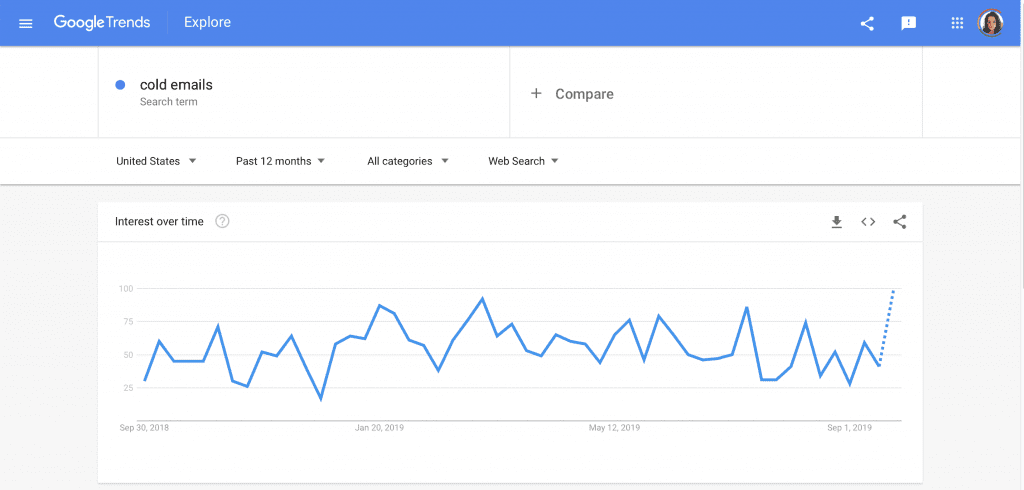
You can also compare your topic against others (click the + Compare field). In the example below, I compared “cold emails” to “make money online” and “freelance writing jobs.” The results show that “make money online” is much more popular, even though the other two are popular in their own right.
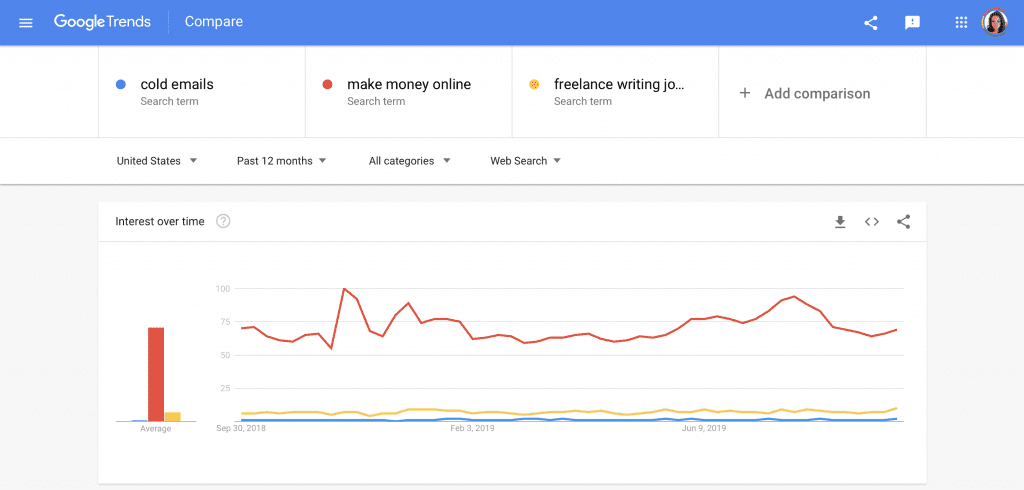
I learn two things from this:
- I’ve chosen a niche with topics that have an audience
- My first posts should be about making money online if I want the best chance at attracting an audience
My first post could be about different ways to make money online as a freelance writer, and then I could write spin-off posts that dive deeper into each of those ways. As a podcaster, I could make my main episodes about making money online, then put out mini-episodes that dive into the other topics. I’m staying within my niche, and I’ve sought out the most attractive sub-niches of it.
Keyword Research for More Specific Stats
Google Trends is an excellent first step – if there’s no audience, you know you need a new niche – but keyword research will give you more specific and recent insight into your niche. There are several free tools you can use, like KWFinder and Moz’s Keyword Explorer.
- Grab your list of 10+ keywords
- Enter the first one in the research tool
- You’ll get results for the phrase you entered, plus more ideas
- Repeat the process with all of your keywords to see which ones to prioritize
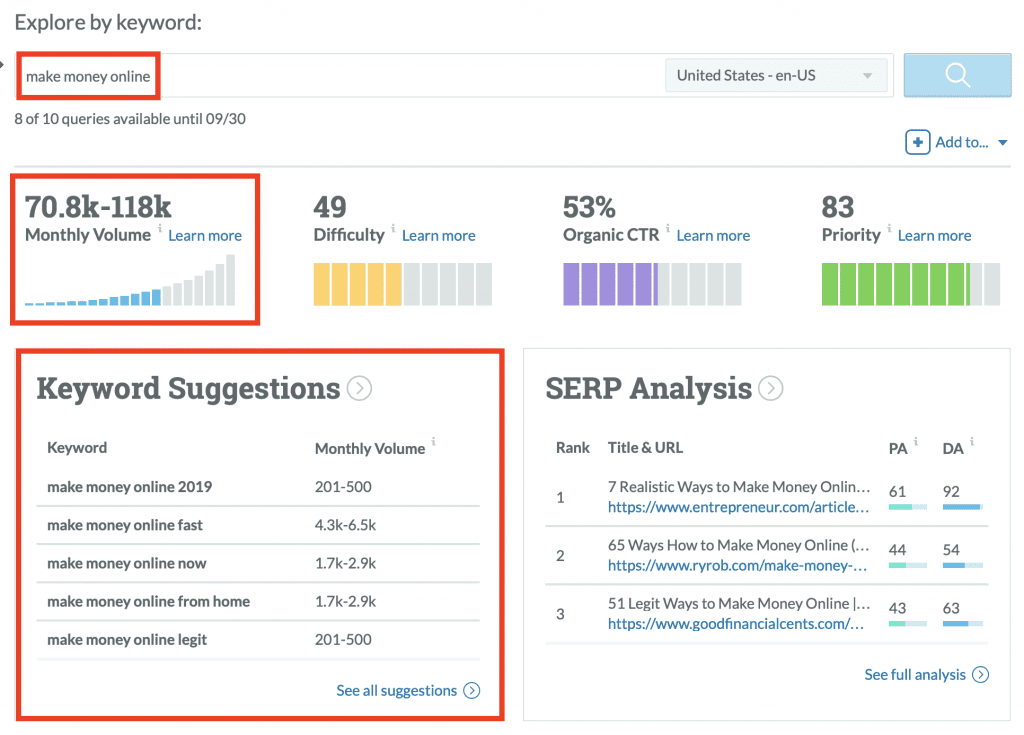
Source: Moz
Generally, you want your search terms to have thousands of monthly searches, especially when it comes to the main terms.
Discovering Monetization Options
You have a topic that you’re interested in and that there’s an audience for. Can you actually make money from it, though? (Also, you may not care about monetizing it – you may be happy with writing or podcasting about your passion and building an audience.) Go to Google and search for your main topic or use a tool like BuzzSumo. You’re looking for top blogs in your niche.
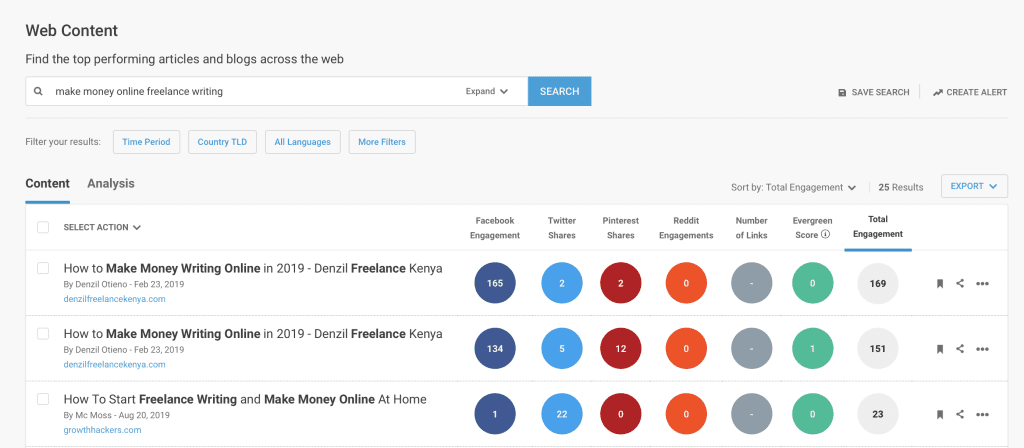
Source: BuzzSumo
Open up a few of the blogs and poke around to see how they’ve monetized. You’ll probably come across at least one of three popular monetization options:
- Affiliate links
- Banner ads or other types of display advertisements
- Selling their own information products
If the creators are doing any of these things and they seem to be doing them well, you’ve chosen a niche that can be monetized. Note that it’s not easy to determine how well display ads are doing. However, you can check out Amazon to vet the popularity of affiliate products and you can check for social proof about info products.
How to Handle the Ideas That Don’t Fit Into a Niche
Even if you’ve started a podcast for your main passion or you have five niche blogs that you regularly create content for, you’ll think up the rogue idea that doesn’t seem to fit anywhere. Should you start another blog or podcast for it? Maybe, but not yet.
A personal blog is the perfect place for these random, one-off ideas to live, at least until you have several random, one-off ideas that are actually related to each other and deserve their own, focused outlet. You won’t have as easy a time monetizing a personal blog, but you will likely attract people who return more for your voice and writing style than anything else. These are the people that go, “I don’t care what the topic is; I’ll read anything that person writes.”
Wrapping Up
Choosing a niche takes a lot of work, both internal and external – it requires equal parts introspection and good ol’ audience discovery. There’s also the possibility that you’ll dive head first into a niche you thought you loved only to burn out after 20 or so articles. That’s okay – consider it part of the research phase. Once you hit that sweet spot, though – you’re just as into your topic as your audience, and you have a big enough fan base to start monetizing – you’ll know the joy of being so immersed in a topic that you eat, sleep and breathe it.
If you want to explore this topic more, check out our article about 12 Types of Blogs and When They’re Most Successful.
Featured image via Demian_shutter / shutterstock.com






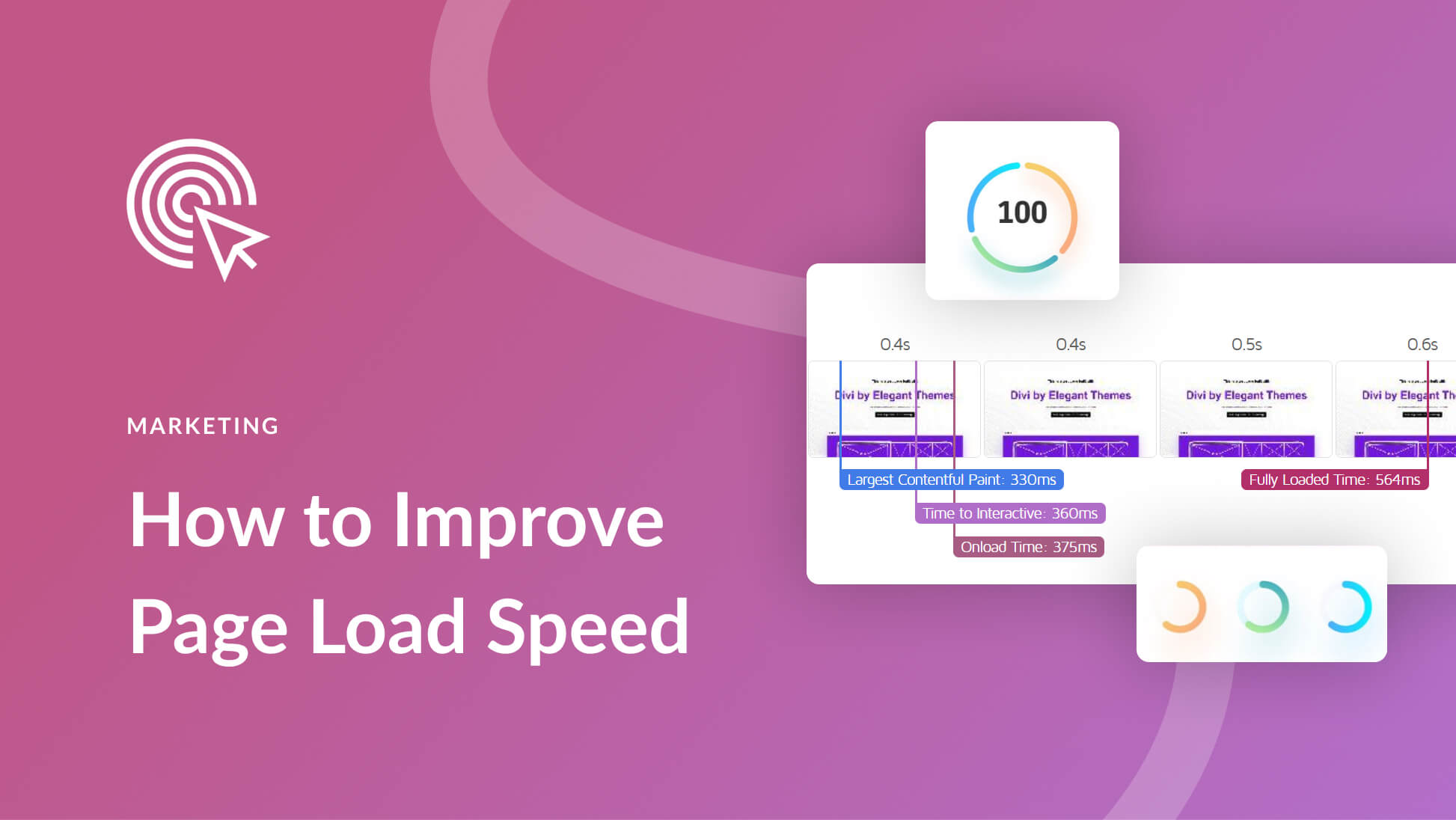
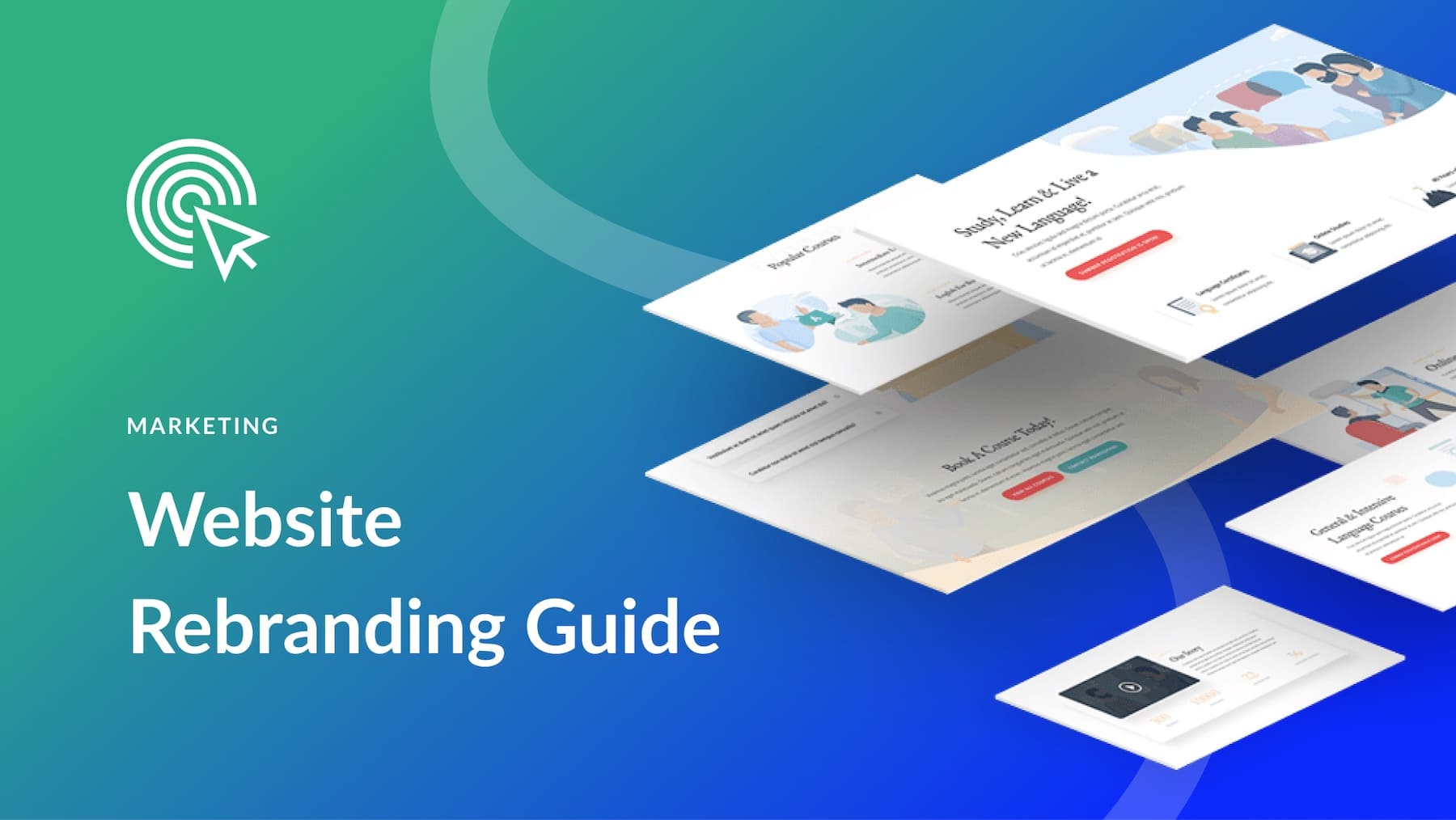

I’m a great consumer of podcasts, and as a voiceover, I work on a lot of other people’s podcasts, but this is some really inspiring stuff to get me thinking about (and hopefully creating) my very own podcast. Thank you.
Hey Lindsay,
Your post was so engaging I actually read the whole thing. However, i think it would be great if you expanded on the strategies for brainstorming, like practical methods or tools one can use. Secondly, anyone can get lost in the keyword research, where monetization can be bit difficult due to the demand of high volume keywords. I must say, great insights. Thanks for sharing!